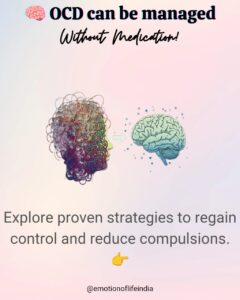
Solutions for Obsessive-Compulsive Disorder (OCD)
Obsessive-Compulsive Disorder (OCD) is a complex mental health condition that affects individuals across various age groups and backgrounds. Characterized by persistent, intrusive thoughts (obsessions) and repetitive behaviors (compulsions), OCD can significantly disrupt daily life, relationships, and overall well-being. Addressing OCD requires a structured and evidence-based approach that empowers individuals to manage their symptoms effectively.
This article explores comprehensive Solutions for Obsessive-Compulsive Disorder (OCD) to manage OCD, emphasizing psychological interventions, behavioral techniques, mindfulness practices, lifestyle modifications, and the importance of strong support systems. These approaches enable individuals to regain control over their thoughts and actions, fostering long-term resilience and well-being.
Understanding OCD: The Cognitive-Behavioral Model
The cognitive-behavioral model of OCD explains that intrusive thoughts are a normal part of human cognition. However, individuals with OCD tend to misinterpret these thoughts as dangerous or significant, leading to distress and an urgent need to neutralize perceived threats through compulsive actions. This cycle reinforces OCD symptoms, making targeted psychological interventions essential to breaking the pattern.
- Cognitive-Behavioral Therapy (CBT) as a Solution for OCD
Cognitive-Behavioral Therapy (CBT) is a well-researched and effective intervention for OCD. It helps individuals identify and challenge irrational beliefs, reducing the intensity and frequency of obsessions and compulsions.
- Cognitive Restructuring: Individuals learn to recognize and reframe distorted thoughts. For example, a person with a fear of contamination may believe that touching a doorknob will result in severe illness. Through cognitive restructuring, they learn to assess the realistic probability of such an event.
- Behavioral Experiments: These involve testing fears in controlled settings. For instance, an individual with checking compulsions may be guided to leave a room without repeatedly verifying that the lights are off, ultimately realizing that their feared consequence does not occur.
CBT equips individuals with lifelong skills to manage their symptoms and regain a sense of autonomy over their thoughts and behaviors.
- Exposure and Response Prevention (ERP) as a Solution for OCD
Exposure and Response Prevention (ERP) is a highly effective behavioral therapy for OCD. It involves exposing individuals to anxiety-provoking situations while preventing them from engaging in compulsive behaviors.
- Gradual Exposure: Patients confront their fears step by step. For example, someone with a fear of germs may start by touching a clean object and progress to handling items they perceive as contaminated.
- Response Prevention: Individuals learn to resist compulsions. For example, rather than washing their hands immediately after touching a surface, they practice tolerating discomfort until the urge diminishes naturally.
ERP is highly effective in breaking the cycle of OCD, allowing individuals to build tolerance to anxiety and uncertainty without resorting to compulsions.
- Mindfulness and Acceptance-Based Interventions
Mindfulness-based therapies help individuals develop a different relationship with their thoughts, reducing distress and reactivity to obsessions.
- Mindfulness Meditation: Practices such as breath awareness, guided meditation, and body scanning help individuals cultivate a present-focused mindset, preventing them from becoming overwhelmed by intrusive thoughts.
- Acceptance and Commitment Therapy (ACT): ACT teaches individuals to accept their thoughts without judgment rather than struggling to eliminate them. Cognitive defusion techniques help separate thoughts from reality, reducing their emotional impact.
- Thought Labeling: This technique encourages individuals to recognize that thoughts are simply mental events, not absolute truths requiring immediate action.
By integrating mindfulness into daily routines, individuals with OCD can develop greater emotional resilience and reduce compulsive urges.
- Behavioral Strategies and Habit Reversal Training (HRT)
For individuals struggling with compulsive behaviors such as excessive handwashing, checking, or body-focused repetitive behaviors (e.g., skin picking, hair pulling), Habit Reversal Training (HRT) is a valuable tool.
- Awareness Training: Individuals learn to recognize the triggers and urges associated with compulsions.
- Competing Responses: Instead of engaging in a compulsion, individuals practice alternative behaviors, such as deep breathing or clenching their fists.
- Self-Monitoring: Keeping a journal of triggers and responses helps track progress and identify effective coping mechanisms.
HRT empowers individuals to regain control over their behaviors, reducing compulsions over time.
- Lifestyle Modifications to Manage OCD Symptoms
Daily habits play a crucial role in managing OCD symptoms. Implementing lifestyle changes enhances overall well-being and provides additional coping strategies.
- Managing Stress: Since stress exacerbates OCD symptoms, techniques such as progressive muscle relaxation, yoga, and guided imagery help regulate emotions.
- Doing Regular Exercise: Engaging in physical activity, particularly aerobic exercise, supports mental health by reducing stress hormones and enhancing mood stability.
- Maintaining Sleep quality Hygiene: Poor sleep can worsen intrusive thoughts and emotional regulation. Establishing a consistent bedtime routine, reducing screen time, and engaging in relaxation techniques can improve sleep quality.
- Diet & Nutrition: A balanced diet rich in omega-3 fatty acids, magnesium, and probiotics supports cognitive function and emotional stability. Avoiding excessive caffeine and sugar can help minimize anxiety fluctuations.
By prioritizing healthy lifestyle habits, individuals with OCD can enhance their overall resilience and improve their ability to manage symptoms effectively.
- Support Systems and Psychoeducation
Having a strong support network significantly contributes to OCD management. Educating loved ones and engaging in community support provides emotional reinforcement and encouragement.
- Family and Caregiver Involvement: Educating family members about OCD reduces misunderstandings and prevents enabling behaviors. Encouraging family members to avoid accommodating compulsions strengthens ERP treatment outcomes.
- Professional Guidance: Working with therapists trained in OCD interventions ensures that individuals receive expert guidance tailored to their specific challenges.
- Therapeutic Support Networks:In addition to individual therapy, participating in group therapy sessions led by professionals can provide structured guidance and peer encouragement. These networks help individuals learn from shared experiences while gaining insights from trained mental health professionals.
A well-informed and supportive environment fosters long-term success in overcoming OCD challenges.
Conclusion
Solution for OCD requires a multifaceted approach that empowers individuals with effective strategies to manage their symptoms. Evidence-based psychological interventions such as CBT, ERP, mindfulness, behavioral techniques, and lifestyle modifications provide robust frameworks for sustained recovery.
At Emotion Of Life, advocating for these non-medication solutions enhances patient autonomy, reduces distress, and fosters resilience. Encouraging individuals to integrate these approaches into their daily lives lead to meaningful improvements in their mental well-being, empowering them to regain control and live fulfilling lives free from the constraints of OCD.
You can write to us: info@emotionoflife.in or reach out us via call 9368503416 or visit our website- www.emotionoflife.in
